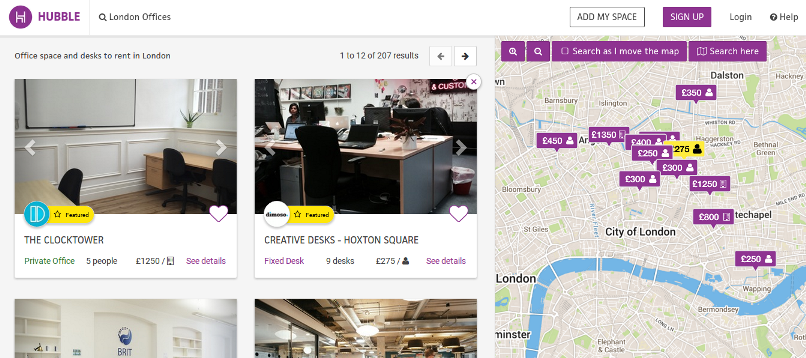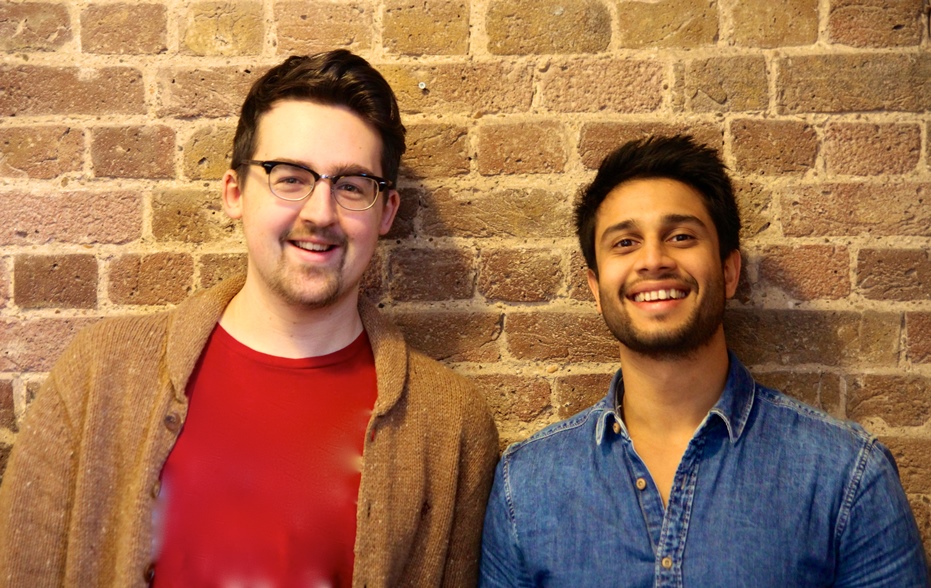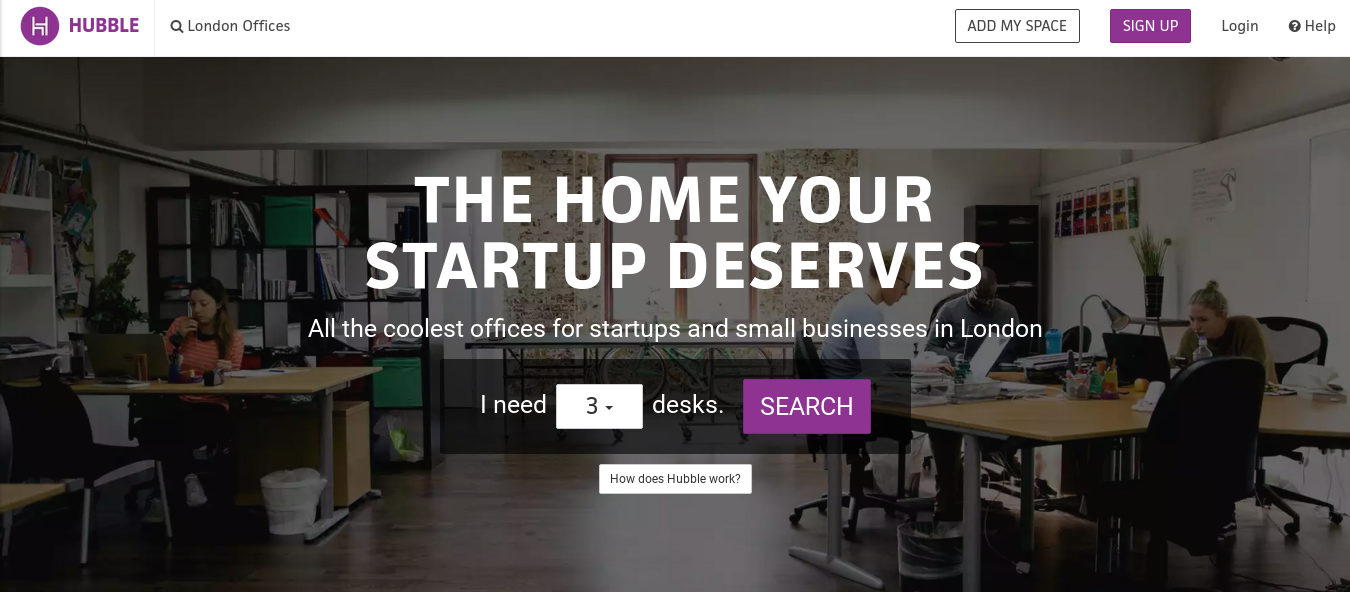Hubble is an online marketplace to rent office space in London. It is a tech platform which enables any business to rent office space by the desk, with an all-in monthly price (like a gym membership) and a short-term rolling contract without ever needing to commit to a long-term lease. Hubble just hit an incredible milestone of having 10,000 desks (in 500 offices) available to rent in London, including an exclusive deal with the most recently crowned European Unicorn, Funding Circle, to rent 400 desks in their brand spanking new office.
-= Purpose =-
What problem did you set out to fix in this world? How did you want to disrupt or disrupted your industry? What inspired you do this?
Technology has fundamentally changed how companies of all shapes and sizes use space. Retailers are selling online and they need less fixed stores, but more click and collect points & pop-ups. Remote working and hot-desking is becoming the norm in large companies. Freelancers that pop in and out for project based work are being preferred over hiring full-time staff. The next big startups are being built on laptops in coffee shops.
It’s becoming more and more obvious that commercial space, especially office space has to be available on-demand, expand and contract with ease and become a hub to facilitate meaningful human interaction that is impossible to achieve remotely. Unfortunately, the commercial property industry still works like it did 20 years ago. Typically, office space is only available if you sign up for a 10 year lease, put down a hefty deposit, pay fees to agents & lawyers and then spend money on furniture, utilities & maintenance. Most businesses, big and small, have no idea how much space they’ll need in 10 months, let alone 10 years.
Our vision is for Hubble to be the driving force behind creating flexibility in the rigid world of commercial property and finding every company their perfect home.
How did you make it happen? Did you write a business plan, had a clear strategy and a business model or did you just started doing it and then figured it out in the process. Has your initial vision changed since the launch?
I started noticing these trends in my previous job as an investment banker, advising a company that was in huge trouble due to its long term lease commitments on space it no longer needed. When I suggested to my boss that there could be an alternative use to this space, my suggestion was laughed off, but still stuck in my mind. From then, I kept seeing the same problem everywhere and knew I had stumbled across something huge.
I didn’t know exactly what the solution was yet, but I quit my job and joined Entrepreneur First where I met my co-founders Tom and Rohan (Co-founder of Second Home & advisor to the Prime Minister). Entrepreneur First helped us use lean startup methodology and hypothesis testing to work out the solution, and build the product.
We knew the problem that we were solving would take years to solve; bringing a fresh perspective to an industry resistant to change is incredibly tough.
We have an overarching vision of what Hubble looks like in 5 to 10 years time, but we remain incredibly agile, only roadmapping features for the next 60 days. This combination of visualising our destination, having an idea of how we’re going to get there but being open to other perspectives, keeps us nimble as we hit bumps on the road.
What’s the biggest risk that you’ve ever taken and how did it turn out?
The biggest risk was starting a company in an industry that none of the founders had ever worked in before. An even bigger risk was hiring an entire team of people that hadn’t worked in the industry before.
The risk paid off massively. Not being from the commercial property industry meant that it was easy for us for us to bring an entirely new perspective to an industry embroiled in outdated heuristics and myopia. In fact, it was the main reason we were able to bring so much change to an industry in such a short space of time. Whenever we have doubts, we remind ourselves that Jeff Bezos had never worked in retail, Travis Kalanick had never worked in transportation & Brian Chesky had never worked in hotels.

-= Advice: From launch to funding=-
What would be your tip to someone looking for an investment? How did you find your investors?
My main tip would be look for investors that intimately understand your customers, industry and / or business model. Hubble is a B2B commercial property marketplace.
We have been to plenty of meetings where the investors typically invest in something completely different, like consumer apps; they struggle to understand Hubble and get excited by it. We’ve come out of those meetings frustrated and depressed.
However, we have much more success with investors that have invested in something similar to us; they understand the business straight away. Funnily enough, our last funding round consisted of investors that are experts in property, marketplaces & B2B.
What 3 pieces of advice would you give to startup founders? What do founders need to focus on in order to be successful?
- Ruthless prioritisation – as a founder, you will always have a 100 things to do, with the list growing by the minute. You need to be able to able prioritise that list based on what will make the most impact, for the time / effort it takes compared the next most important task. You need to do this constantly to be effective, along with saying no to unimportant time consuming tasks.
- Selective hearing – everyone and their mother has a strong opinion on business ideas. Its this sentiment that makes shows like The Apprentice & Dragon’s Den so popular. As a founder, this can be exhausting as you hear contradictory advice all the time. Unless they are your customers or a founder with a similar business to you, ignore them and decline unsolicited advice from generic “business mentors.”
- Use your data – in the early days its easy to work out what to focus on as you have a strong intuitive sense of what’s going well or badly. However, as you grow, you have to start relying more on your data to drive your decisions; in many cases the right thing to do is counterintuitive.
-= Productivity & Constant Learning=-
What are your favourite apps that make your live easier and media sites that you read every day to stay up to date?
Messaging: I use WhatsApp & messenger for personal use; slack & email for work. My favourite email app is Outlook as due to the fact that it lets me schedule email as I want to deal with (remind me tomorrow), separates out my email into ‘focused; & ‘other; & integrates Sunrise, my favourite calendar app.
Reading: I use Pocket to store articles offline which I read on the Tube and Nuzzell to see what the people I follow on Twitter are talking about. I’m loving the new Quartz news app, which has a conversational UI. We have a team slack channel where all share cool articles and I’ve created an IFTTT recipe that lets me automatically post from Pocket to Slack.
Task management: Asana for the team; Google keep for ad-hoc lists & notes.
Audio: Spotify, Tidal (only for Kanye), Audible & Podcasts (a16z podcasts are my regular go-to)
Have you had any mentors or role models that have influenced you? Who do you learn from how to grow your business?
Our investors are experts in the fields we operate in, so they act as a trusted source of advice for us, which is cool.
I’m fortunate enough to be part of a rich and diverse entrepreneurial community where I learn from and am constantly inspired by people I meet everyday. I learn how to grow my business from listening to my customers mostly; whenever I need help in something specific I’ll normally seek an expert in that field. Starting a business is really tough psychologically & emotionally, so it’s always good to have other founders who can empathise and support you.
Other than that, I’m generally influenced, fascinated & inspired by people challenging the status quo, whether they are in tech or not. It’s the main reason I’ve been a die-hard Kanye fan for the past 15 years; love him or hate him, he’s changed music.
-= Future=-
Where do you see your company in a few years’ time and what are your thoughts on the future of your industry how is it changing?
We see Hubble completely transforming the way commercial property is transacted, managed and financed.
Office space will start to be operated more like a gyms or a a hotel, where in addition to the physical space, there is an entire services layer that is paid for as it is booked / used or accessed by a short-term rolling contract.
SMEs will become the mainstay of the economy as technology allows more valuable companies to be built with less headcount and larger companies will start using office space as a way of getting people together to do knowledge work, than to sit in isolation in a cubicle all day.
What kinds of companies or particular technologies are you most excited about right now and what trends do you think are overhyped?
I’m very excited about smart cities. I’m purely speculating, but I think Citymapper are trying to build the operating system for smart cities, by first building a picture of how everyone moves around a city so they can start making connections between things that never spoke to each other before. I.e – deploying a fleet of taxis to a station where trains have been cancelled in real-time, actively preventing traffic jams and buildings responding to outside environments. It’s going to be much cooler than Minority Report.
I think VR headsets are overhyped. They seem to be everywhere and also nowhere at the same time; people don’t like wearing big bulky things on their faces. We’ve still got a few years to go until mass adoption.






